Fact and Opinion Worksheets
Recognizing the difference between facts and opinions is a skill that is often evaluated on state reading tests. In my experience I've found that students often get confused trying to determine whether a statement is factually accurate, and that is not the skill that is evaluated. Therefore, I teach students that a fact is any statement that can be proven: "there are 10,000 feet in a mile." Even though this statement is incorrect, I teach students that this is still a fact, even though it is not true. When students define a fact as any statement that can be proven to be true or false, they will concern themselves less with whether the statement is accurate and focus more on whether each statement can be proven. Hence, they will better be able to identify facts and opinions.
I hope these worksheets and resources help you teach your students to reliably distinguish between statements of fact and opinion. Learn more about teaching fact and opinion?

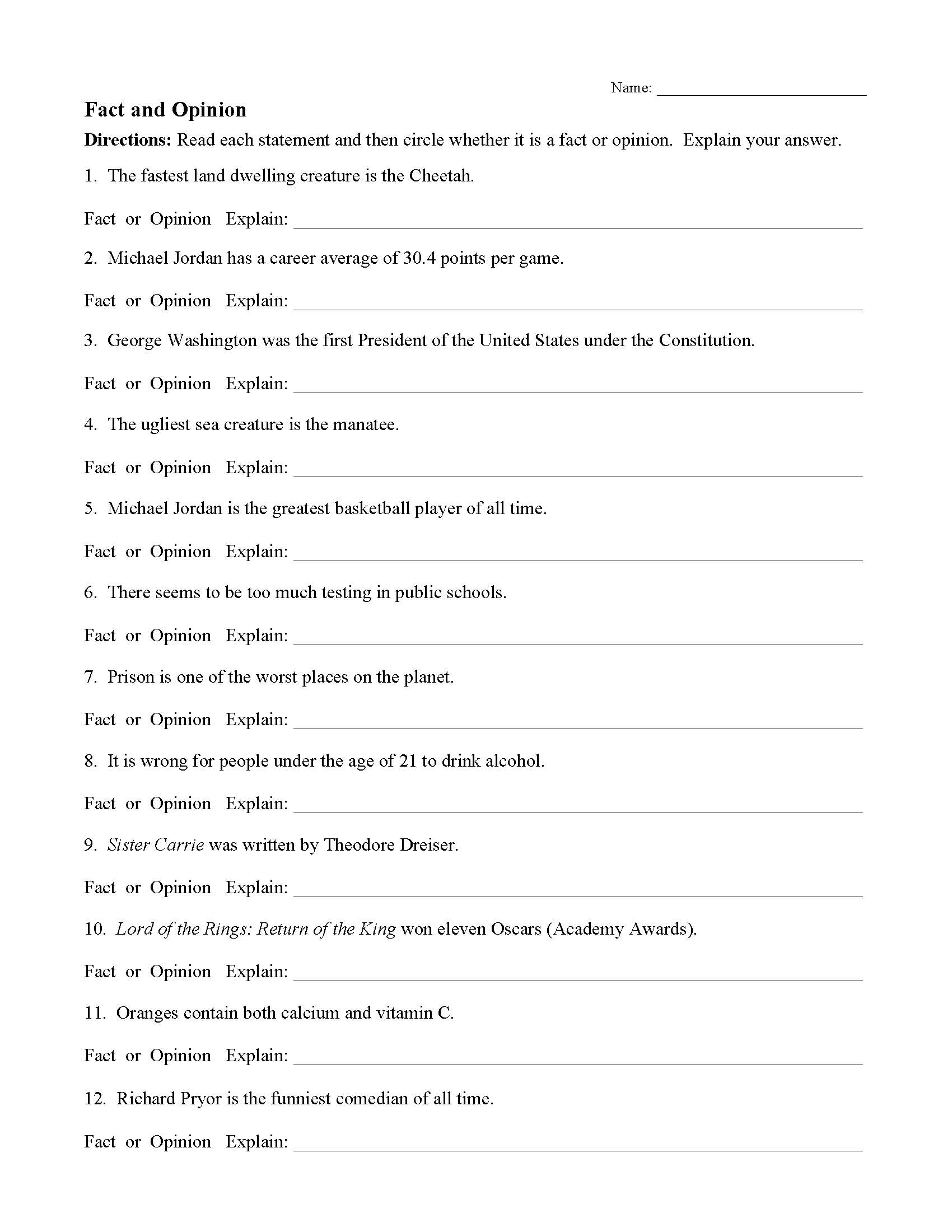
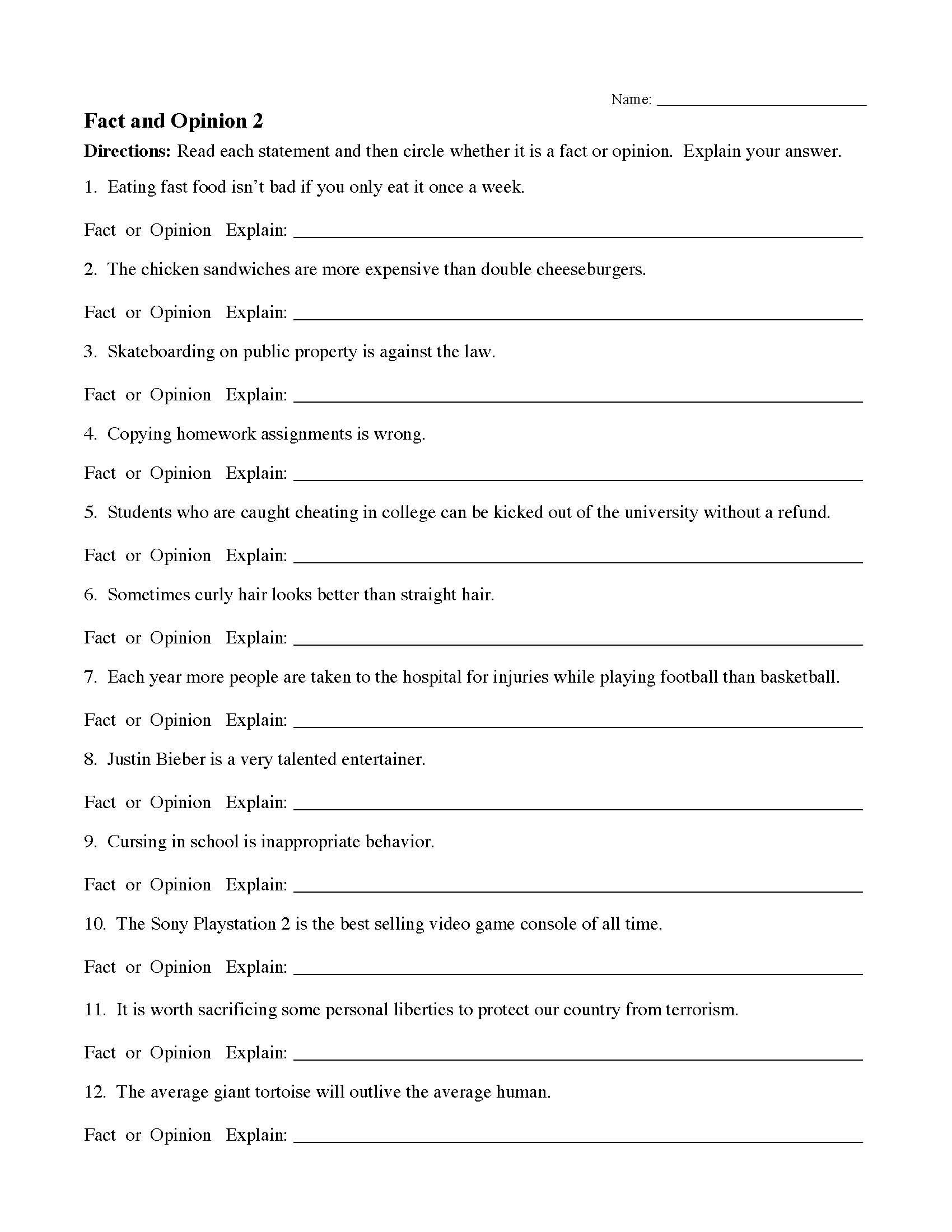
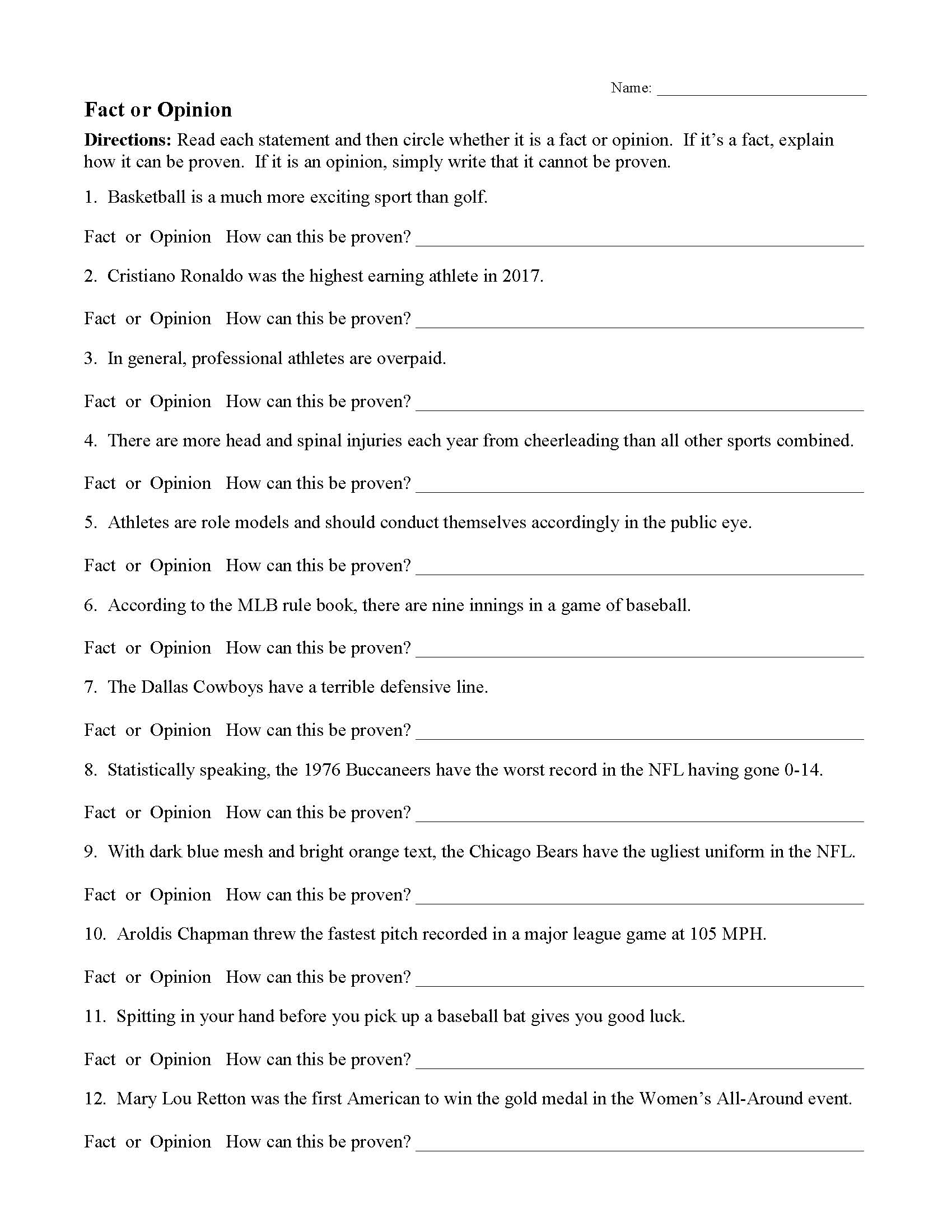
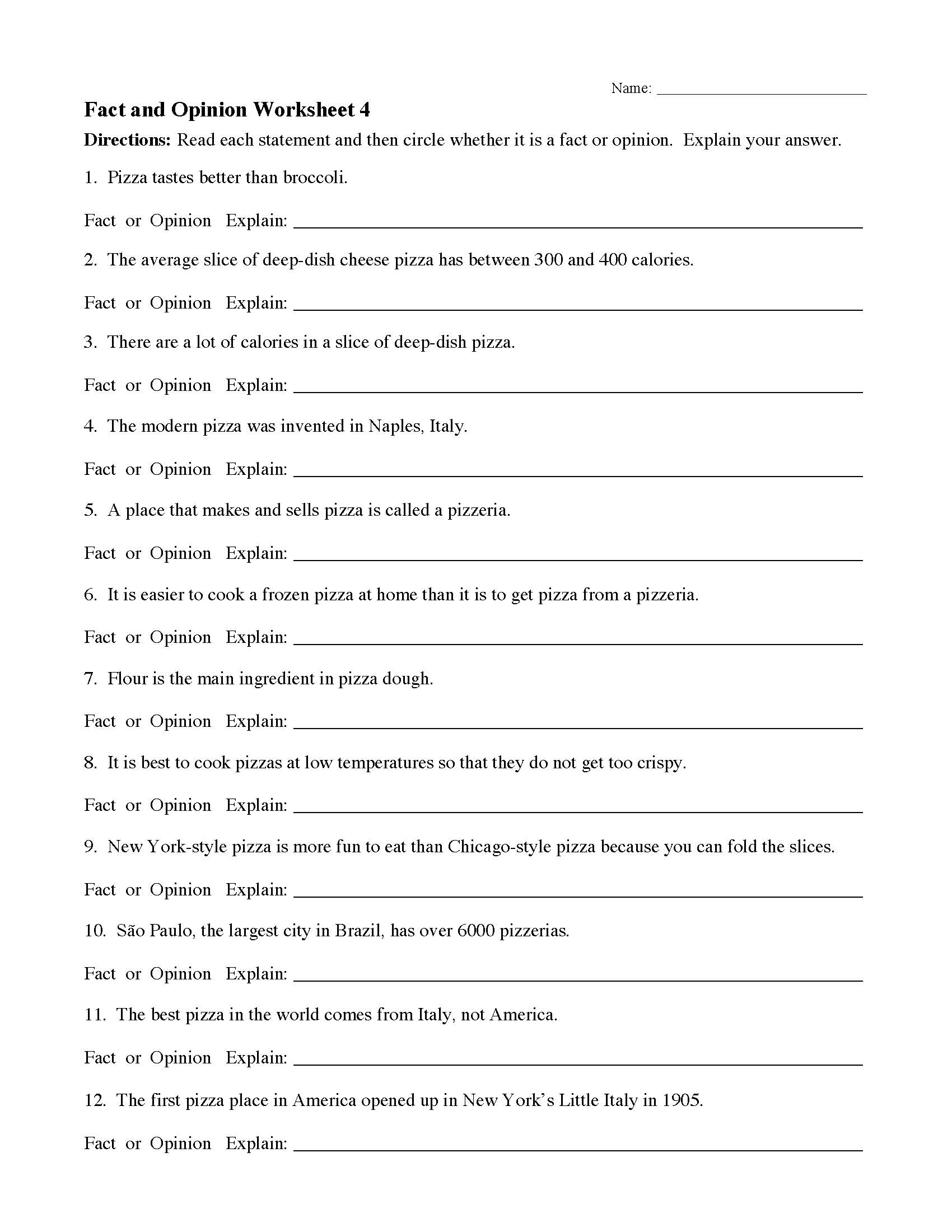
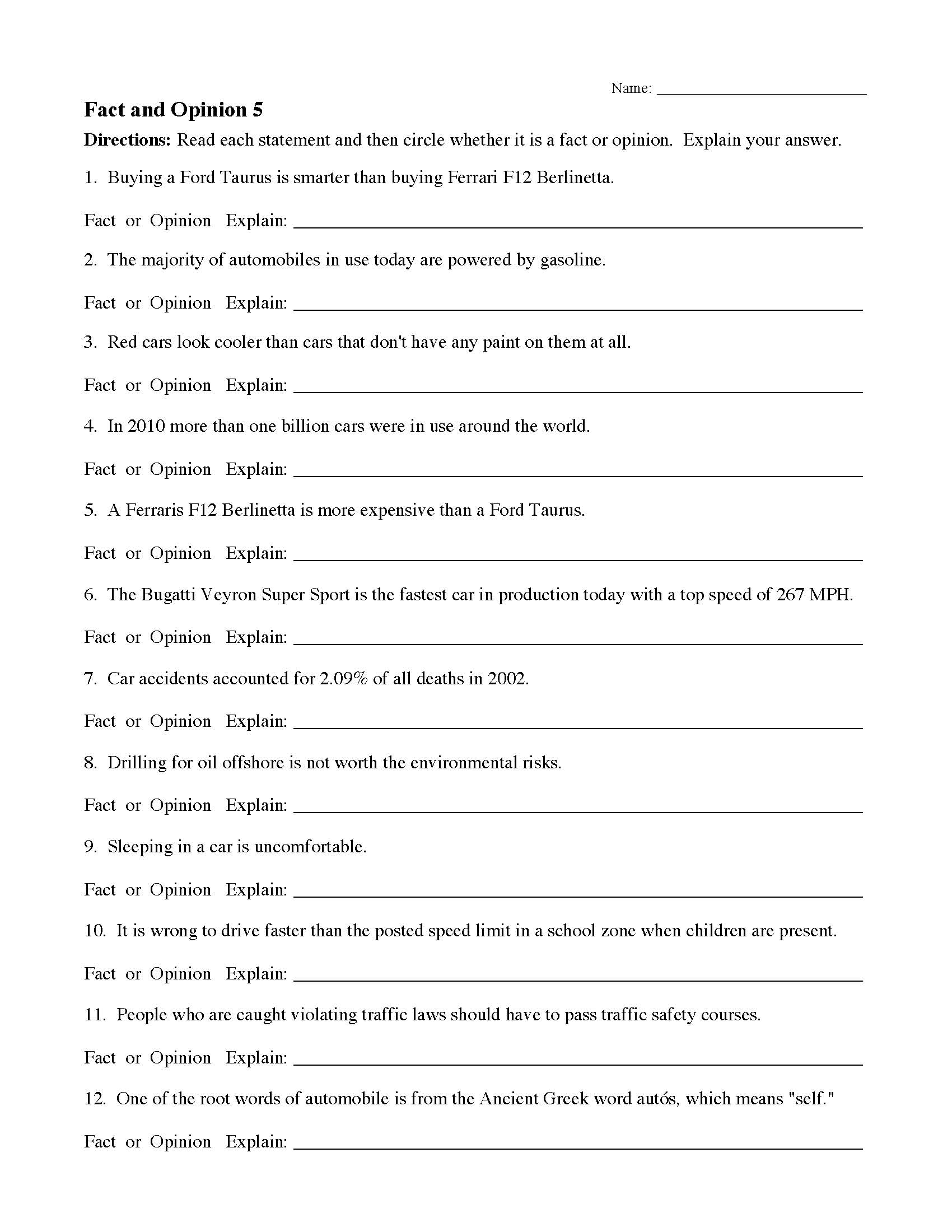
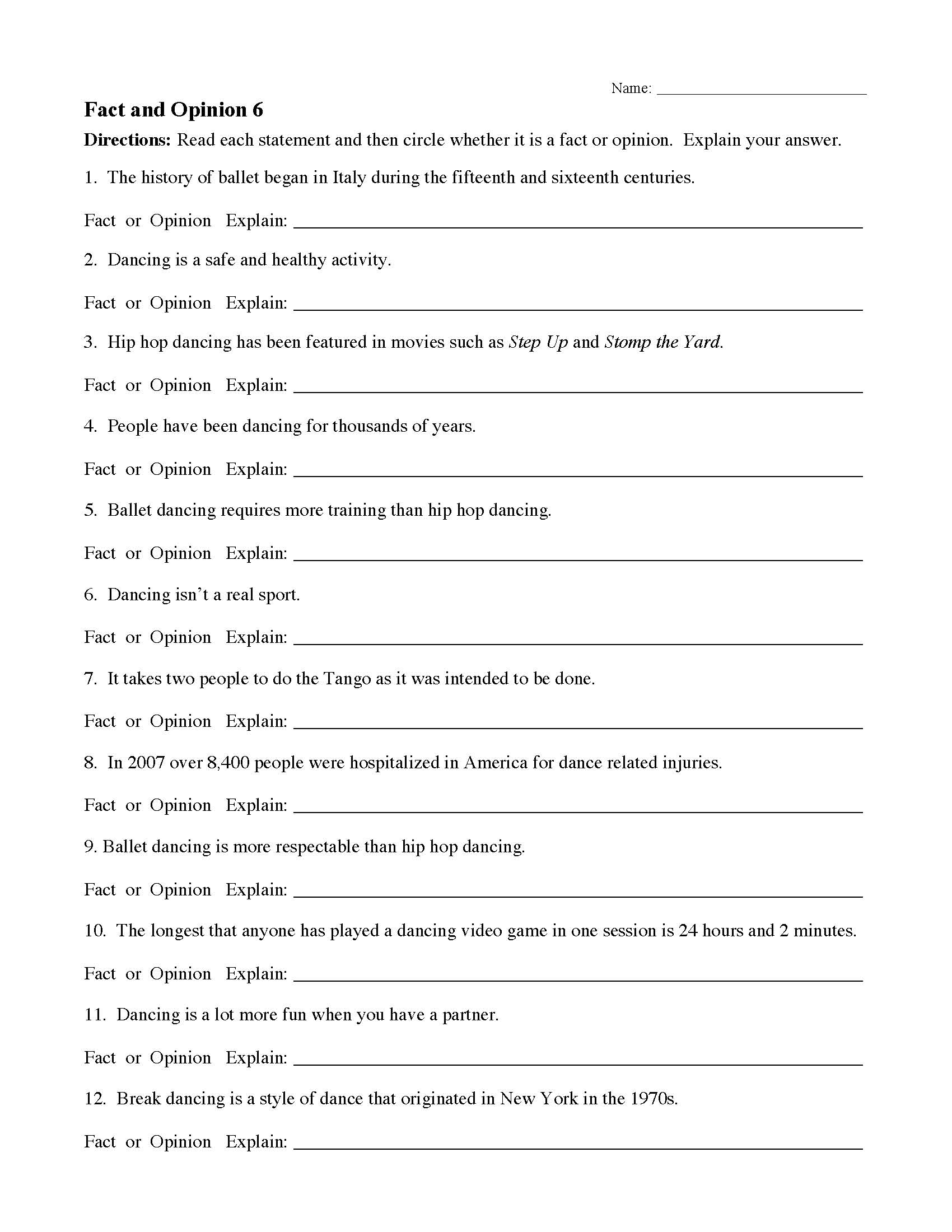
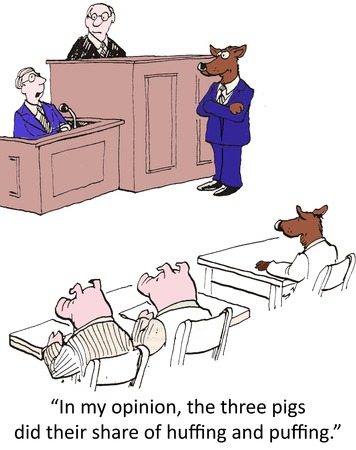
Fact and Opinion
Common Core State Standards
W.1.2 - Write informative/explanatory texts in which they name a topic, supply some facts about the topic, and provide some sense of closure.
W.2.2 - Write informative/explanatory texts in which they introduce a topic, use facts and definitions to develop points, and provide a concluding statement or section.
W.3.2b - Develop the topic with facts, definitions, and details.
W.4.2b - Develop the topic with facts, definitions, concrete details, quotations, or other information and examples related to the topic.
W.5.2b - Develop the topic with facts, definitions, concrete details, quotations, or other information and examples related to the topic.
W.6.2b - Develop the topic with relevant facts, definitions, concrete details, quotations, or other information and examples.
W.7.2b - Develop the topic with relevant facts, definitions, concrete details, quotations, or other information and examples.
W.8.2b - Develop the topic with relevant, well-chosen facts, definitions, concrete details, quotations, or other information and examples.
W.9-10.2b - Develop the topic with well-chosen, relevant, and sufficient facts, extended definitions, concrete details, quotations, or other information and examples appropriate to the audience's knowledge of the topic.
SL.2.4 - Tell a story or recount an experience with appropriate facts and relevant, descriptive details, speaking audibly in coherent sentences.
SL.3.4 - Report on a topic or text, tell a story, or recount an experience with appropriate facts and relevant, descriptive details, speaking clearly at an understandable pace.
SL.4.4 - Report on a topic or text, tell a story, or recount an experience in an organized manner, using appropriate facts and relevant, descriptive details to support main ideas or themes; speak clearly at an understandable pace.
SL.5.4 - Report on a topic or text or present an opinion, sequencing ideas logically and using appropriate facts and relevant, descriptive details to support main ideas or themes; speak clearly at an understandable pace.
SL.6.4 - Present claims and findings, sequencing ideas logically and using pertinent descriptions, facts, and details to accentuate main ideas or themes; use appropriate eye contact, adequate volume, and clear pronunciation.
SL.7.4 - Present claims and findings, emphasizing salient points in a focused, coherent manner with pertinent descriptions, facts, details, and examples; use appropriate eye contact, adequate volume, and clear pronunciation.
Search here.
114 Comments
Leave a Reply
- Author's Purpose Worksheets
- Characterization Worksheets
- Conflict Worksheets
- Fact and Opinion Worksheets
- Figurative Language Activities
- Figurative Language Poems with Questions
- Genre Activities
- Irony Worksheets
- Making Predictions
- Mood Worksheets
- Nonfiction Passages and Functional Texts
- Parts of Speech Worksheets
- Poetic Devices
- Point of View Worksheets
- School Project Ideas
- Setting Worksheets
- Simile and Metaphor Worksheets
- Story Structure Worksheets
- Text Structure Worksheets
- Theme Worksheets
- Tone Worksheets
- ALL PAGES AND WORKSHEETS





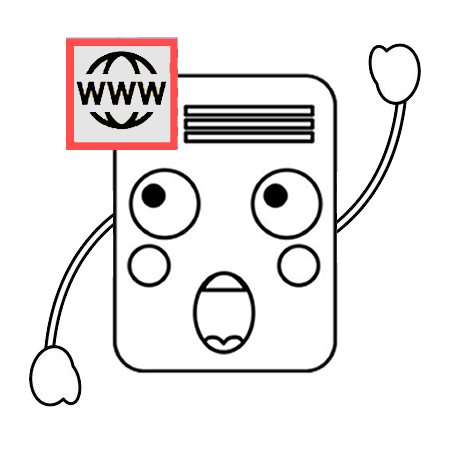

Thompson
/ March 10, 2015This is garbage! It is not a “fact” if it is not true. No wonder kids can’t think anymore or distinguish right from wrong.
Jason McCool
/ March 7, 2015“I teach students that a fact is any statement that can be proven: ‘there are 10,000 feet in a mile.’ Even though this statement is incorrect, I teach students that this is still a fact, even though it is not true.” That definition is contrary to all historical definitions of “facts” as specifically true and correlating to reality. This explains a lot about our failing schools. By your definition, the statement “black is white” is a fact, which is preposterous.
Shannon Morris
/ March 5, 2015You say, ‘I teach students that a fact is any statement that can be proven: “there are 10,000 feet in a mile.” Even though this statement is incorrect, I teach students that this is still a fact, even though it is not true. When students define a fact as any statement that can be proven to be true or false, they will concern themselves less with whether the statement is accurate and focus more on whether each statement can be proven. Hence, they will better be able to identify facts and opinions.’
So you’re saying that a statement can be proven to be false, but it’s still a fact??
Mr. Morton
/ March 5, 2015I’m explaining a way in which I taught students to identify statement of a factual nature.
Ian Wardell
/ March 4, 2015I find it highly disturbing that children are indoctrinated into accepting such transparent nonsense.
The net is full of materialists and scientists who say similar things. However clearly there are facts which cannot be proven, indeed they might well be facts which cannot *even in principle* be proven.
This is essentially logical positivism which was supposed to have been decisively discredited decades ago! It’s scientists which propagate such nonsense, not philosophers!
Matt Skene
/ March 3, 2015There are people whose job it is to make careful conceptual distinctions such as the one between facts and opinions. They’re called professional philosophers. I am one, and I know a whole bunch of them. Not a single one would accept the distinctions you’re making here. The fact that you’re teaching them to students is deeply troubling.
A fact is a true proposition.
An opinion is a proposition that is accepted by an individual.
Neither term has anything to do with proof.
Also, there is significant disagreement about what is required to prove something, and a number of your examples don’t uncontroversially fall into the provable/unprovable distinction that you’re trying to test for as a substitute for the fact/opinion distinction. In particular, the majority of philosophers believe it is possible to prove certain moral claims are true. While this is a controversial matter to some extent, simply teaching students that they are all unprovable is rejecting the majority opinion of experts in a field you obviously aren’t very familiar with. This usually isn’t a good idea.
Mr. Morton
/ March 3, 2015Hi.
Thank you for your input.
I’m going to back away from this now and leave it to the professionals.
I do appreciate the feedback.
Jonas
/ September 3, 2015omg so relieved to see your post on this article Matt Skene. I was troubled by it as well. SO BAD AHHHHHHHHHHHHH. The unwillingness of the author to engage with any dissent is very telling… again… AHHHHHHHHHHHHHHHHHHHHHHHH
Mike
/ March 2, 2015I strongly disagree. To say that cheating (copying homework in your worksheet) is wrong would be a fact. I can’t believe anyone would teach children that morality is “whatever the group you are in decides.” Theft, murder, slavery, rape, and so on are all morally acceptable if the society decides they are? That’s obviously false.
Mr. Morton
/ March 3, 2015Is going to war morally acceptable? Some people think not under any conditions. Some people think so under certain conditions, so called “good wars.” Others believe it is the way of the world.
We have ventured into a philosophical realm from which I would like to return.
Please note that I am sharing my personal view with adults who have inquired as to what they are.
I do not teach children my personal views nor do I promote murder in the classroom.
Jim
/ March 2, 2015Is morality a fact or opinion? Do you provide guidance as to when it is proper to question facts and opinion?
Mr. Morton
/ March 2, 2015Good question.
It is my belief that all morality is a set of opinions. Though very popular, widely accepted, and well-established sets of opinions that we call “morality” exist (i.e. Do not kill people). These opinions vary by culture (i.e. Can soldier kill during wartime? Can the state execute a person who has committed horrible crimes?). Even within broad cultures are more subsets (i.e. Do not kill or harm animals). Since there is no objective way to prove these beliefs, they cannot be facts.
As to your second question, I believe that one should always question facts but only challenge opinions if you’re prepared to make enemies, or in personal cases when a loved one’s opinion might cause harm.
Peter Lupu
/ March 3, 2015Mr. Morton
First, claiming that “facts can be proven” is misleading if you mean either that “all facts can be proven” or that it is part of the meaning of the concept of a “fact” that it can be proven (the second entails the first). Not all facts can be proven (by whom?): there are many facts that cannot and never will be proven (by us!). There is a fact about exactly how many dinosaurs existed. But we will never be able to prove it. Second, the concept of proof is much more complicated than what you are suggesting. Perhaps, in mathematics we have something like a proof. Most scientific claims have various degrees of evidence, but cannot ever be proven. Third, what you call ‘facts’ are really reasonably well confirmed opinions based upon (what is believed to be) a reliable methodology. What you call ‘opinions’ are less well established beliefs that lack confirmation based upon a reliable methodology. So the distinctions you are making here are too fast, too loose, and highly misleading. But you are not alone in making them. This is, I believe, the import of the question above by Jim.
Mr. Morton
/ March 3, 2015Well, it is a complicated and rich subject worthy of dialog. Perhaps my position is indefensible, or perhaps others could defend it. In either case I do not have the time to challenge your arguments, Mr. Lupu. Best wishes!
Tulasi Pratti
/ January 6, 2015This is an amazing website for students.It helped my son in improving his language skills .Thanks to the creators
Michael
/ November 20, 2014I like to see the approach of facts having the ability to be untrue. I’ve been having a debate with my fellow teachers about this. I have one for you, what about sentences like this:
“My favorite food is pizza.” (and let’s assume this is true.) Most teachers say it’s an opinion, but I don’t. What are your thoughts?
Here’s another that stumped my 2nd graders:
Fire is hot. (all teachers said fact, I still lean towards opinion, heavily! 🙂
thanks!
Mr. Morton
/ November 20, 2014Wow, Michael, those are some interesting questions.
I definitely see your argument.
I would argue that “My favorite food is pizza” is an opinion,
given its inability to be measured, but I see where you are going.
The “Fire is hot” example is tricky too.
You’ve got some real mind-benders.
It could be argued that since fire radiates heat,
it is by nature hot;
but it is cooler than magma.
Hmm… I’m stumped.
Thanks for sharing those.
melody binay
/ November 12, 2014thank you so much
you help not only me but my pupils too
Atef Mekdad
/ September 20, 2014You’ve been of great help to me as a teacher. Thank you very much.
Mr. Morton
/ September 25, 2014You are so very welcome.
Ms.lee
/ June 16, 2014This is a great site it need more work sheets
Mr. Morton
/ June 16, 2014Thank you. I am literally going to double the amount of content this July / August.
I think that you will like it.
SUSAN
/ May 8, 2014I LOVE THIS WEBSITE IT HAS HELPED ME A LOT
SUSAN
/ May 8, 2014I LOVE THIS WEBSITE IT HAS HELPED ME A LOT. I GOT A LEVEL 5 IN MY SATS IN YEAR 6 I AM VERY IMPRESSED.
WOW!!!!!!!!!!!!
ashraf farid
/ March 28, 2014simply superb!
Julie
/ March 5, 2014answer 17 on Fact or Opinion Worksheet 1 is definitely FALSE, not even an opinion. Surely you didn’t fall for an urban legend?
http://urbanlegends.about.com/od/fooddrink/a/kfc_chicken_2.htm
Mr. Morton
/ April 21, 2014I’m such a dummy.
I’m going to fix this…
soon…
Timo
/ January 14, 2015Well, it is a FALSE fact – it worked well in my class because you can prove it wrong just like the example in the lesson: 10 inches in a foot.
J Vasilko
/ February 3, 2014Thank you very much for sharing your resources. I have used many of them since I began teaching middle school ELA last year.
My question about your fact and opinion worksheets is: what exactly do you expect students to explain about their answers? Can you give me some examples?
Thanks again!
Mr. Morton
/ April 21, 2014I am sorry that I am slow to respond to your question.
I will post answers with explanations this summer.
Best wishes!
Paige
/ January 30, 2014THANK YOU! My ESL students struggle with reading, especially the deeper aspects such as making inferences and finding the author’s purpose. This will help them a lot! Thanks again!
MissNaddy
/ December 3, 2013Hi there!
Well, i would like to enquire on your power point slides on fact and opinion..
u’ve stated that “Facts maybe true or false”
well, im confused on the part that …”facts maybe false”… do u have other examples? i find it difficult to explain it to my students…
TQ..and btw, this is a really helpful and informative website..keep up the good work ya 😉
Mr. Morton
/ December 3, 2013Hello,
I’ve had people argue with me before about this,
so I no longer argue about it,
but here’s how I do it.
My students often got caught up trying to determine whether
facts were accurate or not that they would over think the question.
I found it helpful to teach them that statements of a factual nature
can be proven to be true or false,
and that they shouldn’t worry about whether they are true or false,
but rather just determine whether they are factual in nature or an opinion.
I hope that helps.
haleemasadia
/ November 14, 2013A bundle of thanks.Prodigious efforts in facilitating teachers with this wonderful resource.
moniqueneita
/ September 14, 2013I am a teacher from Jamaica thanks for your website. The worksheets are a great help.
Mr. Morton
/ September 28, 2013That’s fantastic. I wish you the best.
Evelynn Estrada
/ June 13, 2013Just found this website, very good work
Wiill use with my prep students
Princess Kate
/ May 15, 2013My daughter will grow up to be a smart princess because of this website!
Irfan Farooq, IMS, BZU Multan
/ May 5, 2013Thank you so much for this lesson …
SHAMe
/ May 1, 2013it was very useful 🙂 ty.
Saraj
/ March 10, 2013thank you so much for this, my students struggle with this, and I believe the worksheets on your site will help.
Mr. Morton
/ March 13, 2013I hope so. Thanks for visiting!
Jason P
/ February 18, 2013Well done!! Thank you sir 🙂
Gilbert
/ January 10, 2013I totally enjoyed your good works I am planning to use some of your worksheets to enhance my lesson plans that is if its OK with you.
Thanks for educators like you who can help other educators like me.
Mr. Morton
/ February 3, 2013Absolutely OK, in fact, encouraged. Thanks for visiting and best wishes.
Teacher Me
/ January 10, 2013Thanks, your website has save me a lot of time.
Teacher Thess
/ December 2, 2012Thanks! this site helped me a lot..=)
Teacher Blesi
/ November 27, 2012Thank you for sharing. The activities here are a real time-saver.
Jill
/ November 7, 2012Thank you so much! This is my first year teaching high school ELL (beginner, intermediate and advanced), and your site has been a HUGE help!
Mr. Morton
/ December 2, 2012You can do it!
Pam O'Kell
/ October 31, 2012You fact or opinion worksheet #22 contains a potential for students to receive inappropriate material. The statement should be excluded. Please do not publish this statement. Please contact me if you wish to discuss. Thank you.
Mr. Morton
/ December 2, 2012Yeah, I prefer to leave it as is. Thanks for warning others of the issue, however. #22 contains a reference to Waka Flocka, a rather profane rap artist.
Scott
/ October 9, 2012This website is inspiring, furthermore it is helping me very well. 😀
Judy Price
/ October 6, 2012Thank you so much! This site is exactly what I needed. I am a special education teacher and my students need the extra practice. The short stories are just the right length and my students find them entertaining.
almeda
/ September 5, 2012Great ! <3
A. Adrian
/ August 22, 2012I’ m 1st yr. college student taking Study and Thinking Skills…… while I was surfing for some exercises in my previous topic, and I saw this site and I was very thankful,
I’m sure that I will use this not only now, but up to I finish my studies.
D. Vincent
/ August 7, 2012I just printed out some of your worksheets for my son to utilize as a precursor to his upcoming curriculum this year. I’m happy to say, like many other kids, even though he really doesn’t like doing homework, he looks forward to working on these exercises. He even proposed to me that I print more for him to do. You have my gratitude and you should know, he’s flourishing and excelling rapidly already! Thank you!!
-D. Vincent
Mr. Morton
/ August 10, 2012I’m happy to hear it. There’s no greater advantage for a student than having a supportive parent.
Mr. Smith
/ July 7, 2012WOW!!! THis web link is so good this is all i use!!
Teacher Jesa
/ June 27, 2012this website is helpful!
May
/ June 24, 2012Great Stuff!
E. Nelson
/ April 17, 2012My students and I enjoyed this website. Thank you so much for your time and effort.
E. Nelson
2nd grade
Claudine
/ April 13, 2012I just found this site and love it.
Kathy
/ March 25, 2012Great site! I love this!
norwood
/ March 25, 2012LOVE THIS WEBSITE! I am an ESOL teacher who works with the advanced ELL students. They still need the scaffolding and this is a great resource to start them off and then build the critical thinking skills. LOVE IT. Keep it up. It makes planning so much easier! 🙂 Thank you.
Mr. Morton
/ March 30, 2012Thank you for visiting. I’ve got a bunch of more activities and worksheets I’m just waiting to find time to post.
Mrs. Here
/ January 18, 2012Could I have the answer key to these exercises please?
Thanks a lot,
Mr. Morton
/ January 23, 2012Added…
Liz Vivanco
/ December 14, 2011I love your site! I’ve been teaching Bilingual/ELL, and this is the first year I have one class each of general ed language arts, accelerated LA, and a mix of ELL and gen ed LA for 8th grade. It’s been tough to come up with lessons for all the different levels of students, but your powerpoints and worksheets make it so much easier! I especially enjoy your examples: “Waka Flocka is a lot tougher than Justin Bieber.” Lol! Throw in a few references to Prince Royce and you’ll hook the full gamut. I tell my kids I use your stuff, and they’re constantly asking me if worksheets I make up are from Mr. Morton…we’re all big fans.
Mr. Morton
/ December 14, 2011Wow, that’s really awesome and inspiring. You’ve moved me to post a new fact and opinion worksheet. Bieber is way tougher than Flocka BTW.
Mr. Hughes
/ November 29, 2011Fabulous stuff can’t wait to see what else is here
Bernice Hall
/ November 7, 2011Thanks for such a wonderful website. My students really enjoy the activities.
Mr. Morton
/ November 7, 2011I’m pleased to hear it. Thanks for visiting!